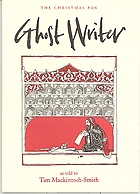Review: ‘The Christmas Fox I: Ghost Writer’ by Tim Mackintosh-Smith
 Title: The Christmas Fox I: Ghost Writer
Title: The Christmas Fox I: Ghost Writer
Author: Tim Mackintosh-Smith
Published: Slightly Foxed, 2005, pp. 31. First edition
Genre: Short story
Blurb: Speaking via its ghost-writer, Tim Mackintosh-Smith, the Arabic manuscript of Abd al-Latif al-Baghdadi tells its own true, if admittedly incredible, story. Set in medieval Cairo and Aleppo, seventeenth-century Oxford and 1960s London, it is a tale of cannibalism, a curse, and of an authorial voice from beyond the grave. Ghost Writer not only redefines the meaning of a talking book; it may even make us listen to our libraries.
When, where and why: Slightly Foxed is a book shop on Gloucester Road that I used to walk past every time I went to visit the Old English Thorn when he lived in halls at university but somehow never went in, probably because I found any shop in South Kensington which wasn’t Tesco slightly intimidating, worrying that I would be summarily shooed out of them for being not nearly moneyed enough. I came across the place again by chance when browsing book websites and noticed that they publish a quarterly magazine and a range of gorgeous looking books. Never one to let such a discovery go uninvestigated, I ordered this book from their website as it looked to be a good starting point.
What I thought: The idea of reading a book from the point of view of a manuscript will either strike you as unutterably dull or absolutely fascinating. Given that I’ve had the opportunity to study, poke and prod old manuscripts I was of the latter group even before I read this little gem of a book, but Tim Mackintosh-Smith carries it off so well than I’m sure Ghost Writer could convert even people of the former opinion. This book is quirky, engaging, amusing and dry and illustrates exactly how a short story should be written, in my opinion.
I think this book holds a special appeal for me because I spent some time a few years ago poring over medieval manuscripts, deciphering the crabbed handwriting, peering at the parchment and examining the coloured inks. Consequently, I love the idea that a manuscript could be just as critical of itself as of the people who read it, cataloging the flaws and foibles of both with equal insight, and, even though Ghost Writer has a mere 31 pages, there were numerous paragraphs that made me chuckle with recognition or at the new perspective they provide:
I’m not the final copy; that was made for the Caliph, al-Nasir, in Abd al-Latif’s native Baghdad. I’ve got some marginal afterthoughts, and the odd blob where the nib of the reed snagged on a backward loop; even a wrong verb ending, forced messily into agreement. But the ink flowed freely through the long fasting afternoons — it was Ramadan, the best month for writers: no cigarette-breaks or coffee-stops — on and on for 140 pages, thirteen lines a page. Not perhaps a pretty hand; but a handsome one, and so instantly legible that you’d never think it was written 800 years ago, and certainly not by a medic. (p. 5)
As you can see, the manuscript narrating the story has a very distinctive voice and is highly opinionated. I enjoyed its somewhat disdainful reference to printed works as ‘clones’ (p. 15) and the way that its statement that it will last ‘until the end of time or the Bodleian Library’ (p. 9) implies that the library will endure the longest. Mackintosh-Smith also plays cleverly with words in this story, turning perfectly commonplace terms that are used without thought into startling and funny ideas by unpacking their meanings:
If I tell you that for us manuscripts the pleasures associated with the physical act of reporduction are not unakin to those felt by you humans in your own version of this activity, and if I remind you that close to 500 years had passed since my last enjoyment of them, you will have some idea of the thrill I experienced. (pp. 17-18)
All in all, I found this to be an enjoyable, highly original story. Not only is the content excellent, the book itself is a lovely object, easy to hold and pleasant to read. I’m definitely going to be buying future editions of The Christmas Fox if this offering is any indication of the quality on offer.
Tea talk: The manuscript says of the work of one of his owners that, ‘This, his magnum opus, was promptly panned by the critics. The good doctor boiled his tea-kettle with the greatest part of the impression’ (p. 21). While I would never dream of burning books, even for the sake of tea, I did feel the need for some tea to accompany this little book, and used it as an opportunity to finish off my Assam. It took me till the end of the packet to work out how best to brew it (show the tea leaves to the water very briefly and then take them away before they get too friendly) but now I’ve got it just right I’ll have to get some more as it’s just delicious and mellow.